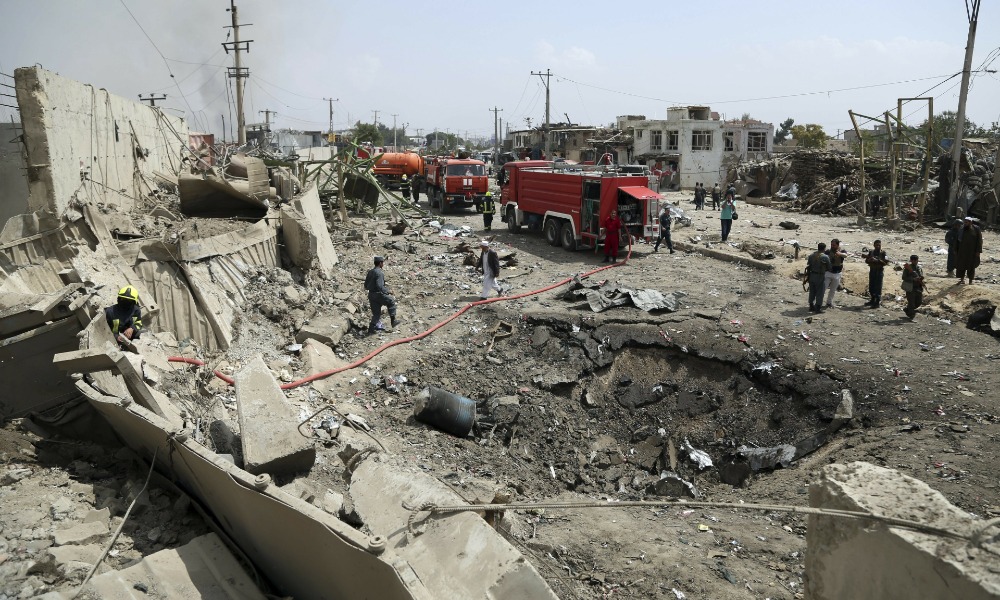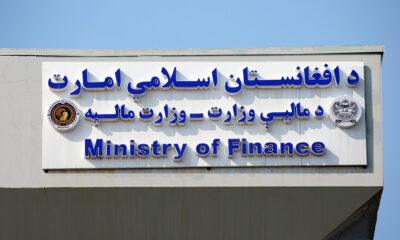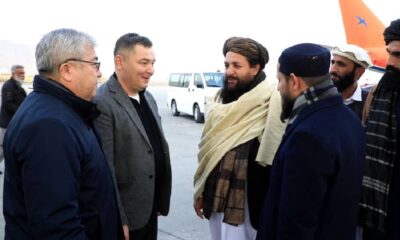Featured
Afghanistan ranked number 1 on Global Terrorism Index

According to Global Terrorism Index 2020 Afghanistan remains the country most impacted by terrorism and was subjected to 26 of the world’s 50 worst terrorist attacks last year.
The report stated that while terrorism deaths in the country declined in 2019 for the first time in three years, the Taliban remained the world’s deadliest terrorist group.
The annual Global Terrorism Index, now in its eighth year, is developed by leading think tank the Institute of Economics and Peace (IEP) and provides the most comprehensive resource on global terrorism trends.
“Whether the peace talks in Afghanistan have a substantial impact on terrorist activity remains to be seen,” read the report.
According to the report, the global economic impact of terrorism in 2019 amounted to US$26.4 billion, a fall of 25 percent from 2018 but Afghanistan was the country with the highest economic impact, equivalent to 16.7 percent of its Gross Domestic Product (GDP).
Just ten countries accounted for over 80 percent of all deaths from terrorism in 2019, the most deaths in a single country were recorded in Afghanistan, accounting for 41 percent of all deaths.
This represents a slight improvement from 2018 when Afghanistan accounted for 45 percent of global terrorism deaths.
“The fall in deaths in Afghanistan is particularly noticeable given its recent history,” read the report.
“Since the peak of violence in 2018, deaths have fallen by just over 22 percent in a year. This reduction was driven by a decline in terrorist deaths attributed to the Taliban and the Khorasan Chapter of the Islamic State (IS-K) which fell by 18 and 61 percent respectively.”
The report stated that IS-K has faced significant territorial losses in Kunar and Nangarhar provinces following attacks by coalition forces but despite the fall in terrorism deaths, 2019 was still the second deadliest year on record for Afghanistan.
The Taliban were the deadliest terrorist group for the second consecutive year while IS-K was the second deadliest group in the country.
The Taliban ruled Afghanistan until 2001 when US Forces and NATO toppled the regime, which was thought to be harboring Al-Qaeda. After the regime was overthrown, the Taliban regrouped across the border in Pakistan and has since led an insurgency against the government of Afghanistan and the US-led Resolute Support Mission.
But, as highlighted by the report, the Taliban has steadily regained territory across Afghanistan.
As of January 2019, it was estimated that the Taliban controlled territory home to approximately 10 percent of the population.
The report states that the Taliban is active solely in Afghanistan but that the Taliban’s Pakistani affiliate group, Tehrik-i Taliban Pakistan (TTP), was responsible for 73 deaths and 30 attacks in Pakistan in 2019, demonstrating a Taliban-related presence outside of Afghanistan.
“In January 2019, the Taliban committed their deadliest terror attack of the year when a suicide bomber and armed assailants targeted a National Directorate for Security (NDS) base in Maydan Shahr district, Wardak, Afghanistan,” the report read.
At least 129 people were killed and 54 people were injured in the attack.
Despite a decline in terrorist deaths from 2018 to 2019, Afghanistan remains the country most impacted for the second consecutive year.
Afghanistan accounted for 41 percent of deaths from terrorism globally, with the Taliban being responsible for 87 percent of these fatalities.
The report stated that during 2019, deaths from terrorism declined by 22 percent, falling to 5,725.
“While this reduction in the number of deaths provides some optimism, it is the second-highest number of deaths recorded from terrorism in Afghanistan since the 2001 US-led invasion.”
In 2019, terrorism was widespread in Afghanistan with terrorist incidents recorded in all of Afghanistan’s 34 provinces, and deaths recorded in every province except Panjshir. The largest number of deaths from terrorism were recorded in Kunduz province with the majority of deaths attributed to the Taliban.
In 2019, there were 500 deaths in Kunduz province, a 77 percent increase from the prior year.
According to the report, recent losses of territory and fighters, IS-K is believed to still have sleeper cells in cities such as Kabul and Jalalabad.
“The presence of the Khorasan Chapter continues to challenge the Taliban. In 2019, the Khorasan Chapter was active in seven provinces, compared to the Taliban who conducted terror attacks across all of Afghanistan’s 34 provinces.
“Sixteen clashes were recorded between the Taliban and the Khorasan Chapter in 2019, mostly in Kunar and Nangarhar provinces,” which are located along the Afghanistan and Pakistan border and have served as operational bases for the IS-K since the group’s inception in 2015.
In 2019, Afghanistan was not only the country most affected by terrorism it also had the highest economic cost of terrorism, equivalent to 16.7 percent of its GDP, read the report.
No other country in 2019 experienced a cost of terrorism greater than four percent of its GDP.
For the full report CLICK HERE
International Sports
Stars react to FIFA Club World Cup match-ups
The draw produced a string of heavyweight match-ups, fascinating sub-plots and regional rivalries.

Players, coaches and officials have reacted to the Club World Cup draw that will be played in the United States from June 16 next year, and despite being six months away, they are all already hard at work plotting their path to the final.
The draw produced a string of heavyweight match-ups, fascinating sub-plots and regional rivalries. Here is some of the best reactions from across the planet to how the eight groups are shaping up.
Group A: SE Palmeiras, FC Porto, Al Ahly FC, Inter Miami CF
“We will have three extremely difficult games in the group stage, but we will prepare ourselves in the best way possible to seek qualification. It is an honour and a joy to compete in the most important club competition in the history of world football.”
Leila Pereira, Palmeiras president
“As players, we gathered to watch the draw together and I think it’s a balanced and good group that includes strong teams such as Inter Miami, Porto, and Palmeiras. I believe we have the ability to reach the knockout stage of the tournament.”
Mohamed El-Shenawy, Al Ahly captain
Group B: Paris Saint-Germain, Atlético de Madrid, Botafogo, Seattle Sounders FC
“It’s an honour for all Atlético fans to participate in the first edition of the FIFA Club World Cup. We have a very difficult group, with three high-level opponents. PSG are a great side, with a brilliant manager and really high-level players. We faced them a few weeks ago [in the UEFA Champions League] and it was a tough battle. It’ll be a difficult debut in the competition. Botafogo just won the Copa Libertadores, showing their enormous potential. The Brazilian sides are brilliant and will make like very difficult for us. Seattle Sounders are one of the best sides in the United States, who keep raising their level every season, and they will be very dangerous and competitive given that they are playing at home. I think it is the most difficult group in this first phase and there will be some great games for the fans”.
Enrique Cerezo, Atlético de Madrid president
“I saw this [Luis Enrique saying that Botafogo would fall into the PSG group]. I want to say that I trust and love anyone with the name Luis Enrique. I saw it, I thought it was super funny and how prophetic, right? He’s a great guy, a great coach. I think Botafogo will shock some people. I believe we are the best team in South America. They play good football in Europe, and so do we.”
John Textor, Botafogo’s owner
“If I look at it from my lens as a soccer fan, a guy who grew up in Seattle, I think it’s unbelievable. You’ve got the biggest club in France. You’ve got a Spanish team that is unbelievably talented, a legendary coach, and then the Copa Libertadores champion. And Joao Paulo, one of our players, actually played for Botafogo. So I mean, just three really fantastic clubs from a fan perspective.”
Brian Schmetzer, Seattle Sounders head coach
Group C: FC Bayern München, Auckland City FC, CA Boca Juniors, SL Benfica
“It’s a great honour to be able to play the Club World Cup with Bayern Munich. I’m really looking forward to this new tournament, where we players can compete against the best in the world at club level. As a player, you always want to play at the highest level. I’m very excited about the matches and who will be the first winners of this new format.”
Harry Kane, Bayern Munich striker
“I’ve never played professionally in my life and never did I think I’d be playing against someone like Harry Kane. I never even thought I could watch someone like that in a stadium let alone go toe-to-toe with them.”
Mario Ilich, Auckland City midfielder
“It’s a difficult group. Bayern Munich, at European level, we’ve never managed to beat. And also Boca Juniors, which is one of the most historic teams in South America. Then Auckland, who we know less about, but who I believe come with the same ambitions as the others. We will do everything we can to get through the group stage, which is our objective. It is a very important competition, a historic moment. We don’t come here to see the party. We want to get as far as possible.”
Rui Costa, Benfica president
Group D: CR Flamengo, Espérance Sportive de Tunis, Chelsea FC, Club León
“Our bracket is difficult, but I’m very confident. We’ll reach the tournament a good moment, still in the middle of the year, when the team won’t be as tired as it usually is at the end of the year.”
Rodolfo Landim, Flamengo president
“We’ve been placed in a tough group, which is a motivating challenge and, in itself, a good thing. This competition also gives us a unique opportunity to experience a wide variety of playing styles from all over the world. We will do everything we can to progress through this group stage and proudly represent our colours.”
Laurentiu Reghecampf, Espérance Sportive de Tunis coach
Group E: CA River Plate, Urawa Red Diamonds, CF Monterrey, FC Internazionale Milano
“We look at rivals objectively and not as something personal. You have to analyse the parties individually. The story of [Martin] Demichelis [Monterrey coach and former River Plate coach and player] has a lot to do with River, we know. We also knew before that we could face each other [Javier Zanettii] in the final. Inter is an opponent with great history. But they are all tough to play against.”
Jorge Brito, River Plate president
“It’s an interesting draw for us. I thought maybe two Europeans would get in, but we got one team from Europe, the others from Mexico and Argentina, so we are playing against three different football cultures. It will be a big challenge for Urawa. It is no secret that the team needs new blood and new players. We need strong characters to achieve our goals.”
Maciej Skorza, Urawa Reds coach
“River Plate are a big club, a great institution and they have a great manager. We’ll have to prepare in the best way. To face a team like River is very difficult, they have great players. It will be a wonderful match.”
Javier Zanetti, Inter Milan vice-president
“Yesterday I told my brother that I wanted to play against Inter and River Plate. I wanted to play against teams I had never played before. The Mexican teams and the South American teams maybe don’t have so many references in Europe, but I think they are going to surprise at the World Cup. There is a lot of talent and a lot of desire to do well.”
Oliver Torres, Monterrey midfielder
Group F: Fluminense FC, Borussia Dortmund, Ulsan HD, Mamelodi Sundowns FC
“The fact that the best teams from all continents and confederations of recent years come together at the FIFA Club World Cup is perhaps best demonstrated by our group: we have four teams and four continents. Personally, I think it’s great that we’re facing a Brazilian team because of our long tradition of BVB players coming from Brazil. We’ve earned the right to be here over the years through our performance. And we’ll take this competition very seriously.”
Lars Ricken, Borussia Dortmund managing director
“It’s a question of mindset and confidence. Football must be played and then it will be 11 against 11. You have to go out on the field and perform as well as possible. Borussia Dortmund is a traditional club, and the same goes for the other two clubs in their countries.”
Branco, Fluminense legend
“After seeing the interest and effort from FIFA to create this tournament, I can feel that the Club World Cup is just around the corner. This is a hard earned opportunity for us. We will be going to the Club World Cup in our strongest form and try to make it a successful tournament for us.”
Kim Kwang-guk, Ulsan HD general manager
“I am so happy to see the name Mamelodi Sundowns listed among the best clubs. I got goosebumps just seeing our name on the screen. It’s such an emotional moment and an incredible achievement for the club.”
Ronwen Williams, Mamelodi Sundowns captain
Group G: Manchester City, Wydad AC, Al Ain FC, Juventus FC
“It’s quite an exciting draw. [We’ve drawn] one team we’ve played a lot and actually play them next week [in the UEFA Champions League], Juventus. It’s a big game, we’ve always had big games against them. Then there’s two teams we’ve never played so it’s going to be an interesting group. They’re tough opposition, so there are going to be good games.”
Roel de Vries, Manchester City Chief Operating Officer
“We will meet one of the favourites for the trophy, Manchester City; in general it will be a tough group, and the opponents are excellent teams. The tournament seems wonderful to me, it is new and there is much to discover”
Stephan Lichtsteiner, Juventus legend
“I am satisfied with this draw. I wanted us to be in the same group as Manchester City, and that wish has been granted. Facing a coach I admire greatly, like Pep Guardiola, motivates me. We now have six months to be at our best and show the world what we, Wydad Athletic, are capable of achieving.”
Rulani Mokwena, Wydad AC coach
Group H: Real Madrid C. F., Al Hilal, CF Pachuca, FC Salzburg
“We’re hugely excited by the start of this competition and we want to try and win it. Pachuca is a Mexican club with great tradition and it won’t be an easy game. We faced Al Hilal in the Club World Cup final and they’re a club that has really grown and boast top quality players. They’re bound to be dangerous. And we’re set to play Salzburg in the Champions League in January as well”.
Emilio Butragueno, Real Madrid Institutional Relations Director
“It is a great pleasure for us that our Salzburg way has now led us to the FIFA Club World Cup, where we will be competing against the world’s best club teams of recent years. I think that this participation is not only a great honour for FC Salzburg, but also a recognition of the entire Austrian club football system, which has steadily developed in recent years.”
Stephan Reiter, Managing Director of FC Salzburg
Featured
UN food agency cuts rations to 2 million Afghans as funds dry up

The UN World Food Programme (WFP) had to cut rations to another two million Afghans this month and is warning of a “catastrophic” winter if funding runs out with little food for remote communities in place, the agency’s country director said.
The cut in rations comes amidst growing alarm over shrinking aid for Afghanistan, where a UN humanitarian response plan is only about a quarter funded, even after the budget was downgraded in the face of funding shortfalls.
WFP funding for food and cash assistance is expected to run out by the end of October and the agency has had to steadily cut assistance through the year to 10 million Afghans.
The positioning of food to areas that will be cut off in winter has also been limited. The WFP said if no funding comes through, 90% of remote areas in need will be cut off without food and even in accessible locations, people will get no supplies during the harsh weather.
“That is the catastrophe that we have to avert,” WFP Afghanistan Country Director Hsiao-Wei Lee told Reuters.
About three-quarters of Afghanistan’s people are in need of humanitarian aid as their country emerges from decades of conflict under an internationally isolated IEA administration that took over as US-backed foreign forces withdrew in 2021.
Development assistance that for years formed the backbone of government finances has been cut and the administration is subject to sanctions and central bank assets abroad have been frozen.
Restrictions by the Islamic Emirate on women, including stopping most female Afghan humanitarian staff from working, are an obstacle to formal recognition and have also put off donors, many of whom have turned their attention to other humanitarian crises.
“What I do in my engagements with them is remind them that at the end of the day, we must focus on those who are most in need,” Lee said of donors.
“The cost of inaction is ultimately borne and paid for by the most vulnerable and poor mothers and children.”
Three million people are now getting food aid but after October, they might be getting nothing.
The WFP needs $1 billion in funding to provide food aid and carry out planned projects until March, Lee said.
For Kabul resident Baba Karim, 45, the cash he has got twice this year from the WFP has been a vital supplement to the less than $2 a day he earns working odd jobs at a market with a push cart.
“I’m so worried about what will happen next, now that the assistance has ended,” said the father of five.
“I lie awake at night worrying about the future of my children.”
Featured
Pulisic scores again to help Milan thrash Torino, Roma slump to Verona loss

AC Milan forward Christian Pulisic struck to set Stefano Pioli’s side on their way to a 4-1 thrashing of Torino in their opening home game of the season in Serie A on Saturday, while Hellas Verona snatched a 2-1 victory over visitors AS Roma.
Pulisic’s opener, two Olivier Giroud penalties and a close-range lob by Theo Hernandez moved Milan provisionally top after they got off to a winning 2-0 start at Bologna on Monday.
“An excellent match, the weekly work made us level up,” Pioli told DAZN. “The team has made an important journey in recent years and top-level reinforcements have arrived… A good group is forming in terms of attitude, availability.”
U.S. international Pulisic looks set to become a new idol at the San Siro after his move from Chelsea as he put Milan ahead in the 33rd minute by firing home from close range in front of a capacity crowd for his second goal in two games, Reuters reported.
Torino defender Perr Schuurs temporarily spoiled the mood when he leveled three minutes later with a first-time effort but that was the visitors’ only shot on target all night.
Giroud restored Milan’s lead with a penalty minutes before halftime, calmly firing the ball into the roof of the net after the hosts were awarded a penalty for handball.
Hernandez chipped goalkeeper Vanja Milinkovic-Savic to add the third in first-half stoppage time following a couple of one-twos with Rafael Leao before Frenchman Giroud converted another spot kick in the second half after Schuurs’ foul on Leao.
Torino, who were held to a 0-0 draw at home by newly-promoted Cagliari on Monday, lacked the ideas to pose any danger in front of Mike Maignan’s goal as Milan kept the ball and continued pushing to increase the scoreline.
Roma disappoint
Jose Mourinho’s Roma fell short at Verona who were quick to take the lead when midfielder Ondrej Duda scored from close range in less than four minutes after visiting goalkeeper Rui Patricio saved a fierce long-range shot by Filippo Terracciano.
Roma had a golden chance to equalize shortly after through midfielder Lorenzo Pellegrini who controlled the ball on the edge of the box but his low shot went inches wide, Reuters reported.
Instead, Verona doubled their lead in first-half stoppage time through forward Cyril Ngonge who left the Milan defense standing as he netted on the counter with a solo run.
Algeria midfielder Houssem Aouar pulled one back for Roma after the break but the visitors were unable to rescue a draw despite Verona finishing with 10 men following an 84th minute red card for Isak Hien for a foul on Andrea Belotti.
Verona, who secured another season in Serie A via a relegation playoff last term, are provisionally second after winning their opening match at Empoli 1-0.
“We conceded an avoidable goal which intimidated us a bit … (but) these matches create mentality and a strong identity,” new Verona manager Marco Baroni told a press conference.
Roma, who were still without Mourinho as he serves a 10-day touchline ban for criticising a referee at the end of last season, have one point after being held to a 2-2 draw by visiting Salernitana last weekend.
-

 Latest News5 days ago
Latest News5 days agoIEA supreme leader stresses enforcement of Sharia law and sincere public service
-

 International Sports4 days ago
International Sports4 days agoIPL 2026: Teams take shape after auction as franchises balance star power and depth
-

 Sport5 days ago
Sport5 days agoILT20: Sharjah Warriorz secure 11-run victory over Gulf Giants
-

 Business5 days ago
Business5 days agoAfghanistan, India discuss expanding investment opportunities
-

 Sport4 days ago
Sport4 days agoAbu Muslim Farah crowned champions of fifth season of Afghanistan Champions League
-

 International Sports3 days ago
International Sports3 days agoILT20: Abu Dhabi Knight Riders end Desert Vipers’ unbeaten run in dramatic one-run win
-

 Latest News5 days ago
Latest News5 days agoEU and IFC launch €5 million program to support Afghanistan’s private sector
-

 Latest News4 days ago
Latest News4 days agoHigh-level Kyrgyz delegation arrives in Kabul





























